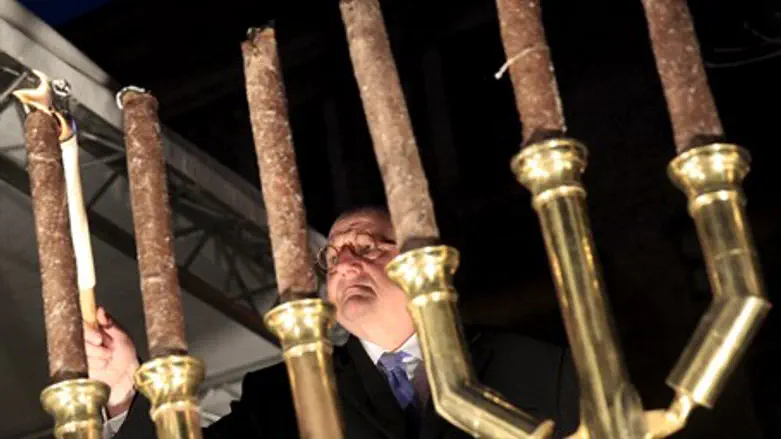
Several hundred people, including an American envoy, joined a protest Sunday organized by Jewish group in Hungary against a planned statue of a World War II-era politician who had held anti-Semitic views, AFP reported.
Around 300 protesters gathered near the building site of the monument, a life-size bronze statue of Balint Homan, in the city of Szekesfehervar.
Homan was an academic, prominent historian and civic leader widely seen as an architect of anti-Jewish laws in the 1930s. He also called for the deportation of Jews from Hungary in 1944, while part of a fascist Hungarian government installed by Nazi Germany.
Around 600,000 Hungarian Jews perished in the Holocaust, almost all at the Nazi death camp Auschwitz in 1944.
"An openly anti-Semitic, fascist politician should never get a statue anywhere in this country," Andras Heisler, head of Hungary's largest Jewish group, the Federation of Jewish Hungarian Communities (Mazsihisz), told the crowd at the protest, according to AFP.
Also present were Israeli and Canadian diplomats and Washington's special envoy on anti-Semitism Ira Forman, the news agency said.
"There is no excuse for this statue, that's something we won't let up on," Forman told AFP.
The private group behind the statue, the Balint Homan Foundation, some of whose members are linked to the far-right Jobbik party, has received both state and municipal funding for the statue in Szekesfehervar, about 60 kilometers (37 miles) southwest of Budapest.
It is scheduled to be unveiled December 29 - the 130th anniversary of Homan's birth.
Protest letters against the statue have also been sent to Hungarian Prime Minister Viktor Orban by the World Jewish Congress and a U.S. Congress taskforce on anti-Semitism.
After the war Homan was handed a life sentence for his role in approving Hungary joining Nazi Germany's invasion of the Soviet Union and died in prison in 1951.
However, a Budapest court in March found there had been a lack of evidence for his conviction, after which Szekesfehervar City Hall approved the statue plan.
On Friday, the city's mayor, a member of Orban's right-wing Fidesz party, urged the foundation to "rethink" the plan, and said if it erects the statue it should pay back the public funding it received.
According to surveys, anti-Semitic attitudes have risen in recent years in EU member Hungary, which is home to Central Europe's largest Jewish community of around 100,000.
Members of the country's second most popular political party, Jobbik, have made regular anti-Semitic statements.
In November of 2012, one of Jobbik’s members released a statement saying that a list should be compiled of all of the Jewish members of government.
He was followed by another Jobbik member who called publicly for the resignation of a fellow MP who claimed to have Israeli citizenship.
Orban's government has sometimes been accused of cozying up to Jobbik and glossing over Hungary's role in the deportation of Jews, despite saying it has "zero tolerance" for anti-Semitism.
In January, Orban acknowledged for the first time his country’s role in the Holocaust, saying many Hungarians chose "bad instead of good" in helping deport Jews to Nazi death camps.
Three government ministers have criticized the monument plan, but stopped short of calling for it to be scrapped.
AFP contributed to this report.